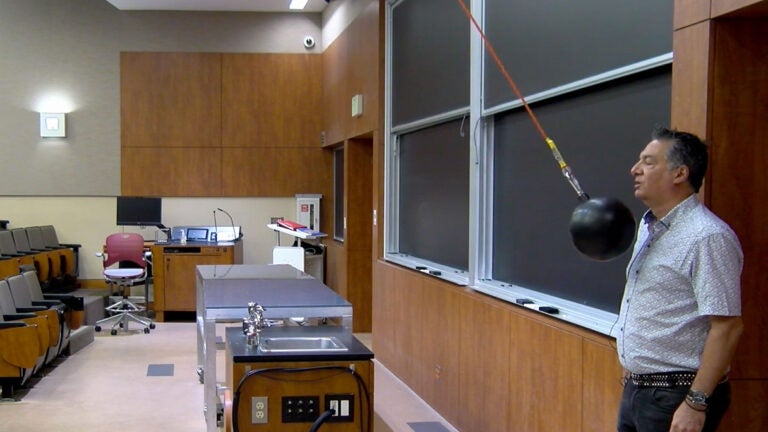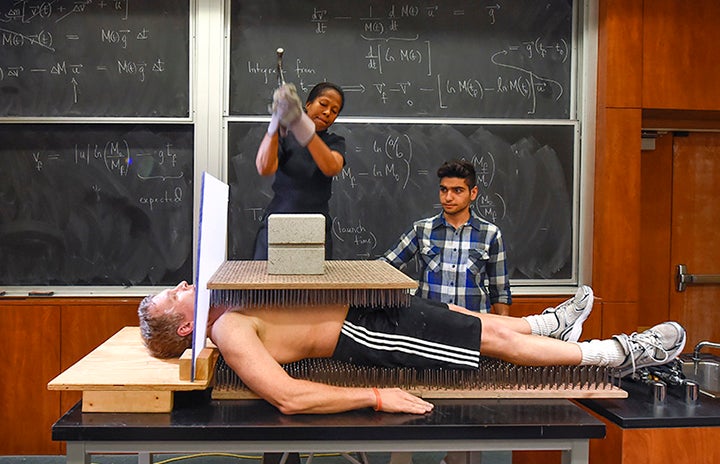
Physics field trip for middle schoolers turns into online festival
They get to peek inside high-tech research labs and watch in awe as scientists pop balloons with lasers and illuminate darkened classrooms with zaps of static electricity.
It’s no wonder the campus visit with physics and astronomy experts from USC Dornsife College of Letters, Arts and Sciences has been the most popular field trip for years among eighth-grade students from A.E. Wright Middle School in Calabasas, Calif. So, when the coronavirus pandemic threatened to derail the annual event, organizers scrambled to find an alternative.
Their solution: an online physics and astronomy festival featuring a virtual tour of the space shuttle, a live Q&A session on the Zoom platform with USC researchers and plenty of exciting physics demonstrations — complete with exploding balloons and electrical light shows.
“The professors did such an amazing job interacting with the students,” said Leah Jenner, a science teacher at the middle school. “It opened their eyes to all different fields of science and how it applies to their life. This shows them the path to a career in science and what scientists actually do.”
That feedback gratifies Angella Johnson, demonstration lab manager at USC Dornsife’s Department of Physics and Astronomy and lead organizer of the festival.
“At the end of the day, that’s what we’re trying to do — nurture and mentor these younger minds to get interested in science,” she said.
Virtual physics festival gets kids excited about science
Johnson knows how meaningful it can be for young children to have scientists as role models. She loved visits to the planetarium and sci-fi shows like Star Trek as a kid. But it wasn’t until she attended an event held by the National Society of Black Physiciststhat she saw a place for someone like her in science.

Angella Johnson, center, does a demo in 2016 with physics professor Gene Bickers, lying on nails. (Photo: Gus Ruelas.)
“I’m a double minority, being a woman of color,” she said. “It gave me the fuel I needed, the boost I needed to continue on.”
To share her love of science with the next generation, Johnson organized a campus visit for eighth-grade science students from A.E. Wright four years ago. The event proved so popular that the department brought it back every year since.
The festival’s virtual stage offered another perk: For the first time, it was open to seventh-grade students, as well.
“Kids really like science and are excited about learning new things,” said Vitaly Kresin, professor of physics and astronomy. “At that age, they recognize it’s really fun. They have not yet been subdued into thinking that science is all about homework and sticking things into equations.”
USC Dornsife experts break scientist stereotypes
Kresin joined five other faculty members to share expertise through short, entertaining lectures, discussions and demonstrations. The department’s resident Hollywood science consultant, Clifford Johnson, professor of physics and astronomy, talked about working on blockbuster action and sci-fi movies. Kenneth Phillips, adjunct professor of the practice of physics and astronomy and aerospace science curator at the nearby California Science Center, led a video tour of the space shuttle.
Cosmologist Vera Gluscevic described watching a movie as a young girl in Serbia that featured a smart and sophisticated woman astrophysicist. The cheesy sci-fi film inspired her to pursue a career in physics.
“Letting the kids know about opportunities and breaking stereotypes of scientists as being exclusively white men by showing who we really are is so powerful,” she said. “We’re sending the message that the image of scientists we’ve built throughout history is not true and that physics is within the reach of everybody who is curious about the world.”
A deeper dive than expected
Stephan Haas, department chair and professor of physics and astronomy, said moving the festival online this year enabled participants to home in on the science. Students peppered the faculty members with questions during the live Q&A — as one professor spoke, others responded to inquiries in the Zoom platform’s chat box.
“Scientifically, it was much more in-depth than any prior event,” Haas said. “In terms of content, wow, I don’t think we’ve ever dug that deeply.”